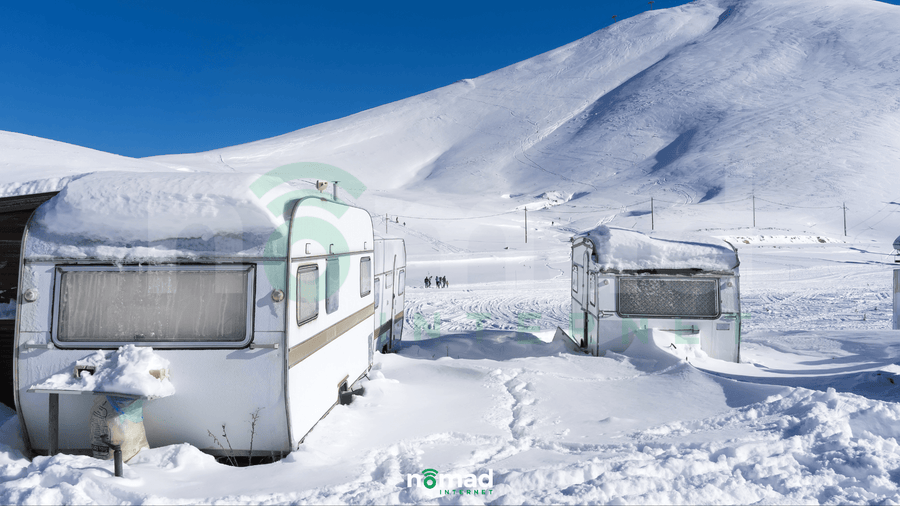Winter is coming! And while some people are getting ready to pack up their RV, others are sticking around and taking advantage of the snow. Winter RV camping offers you an opportunity to explore ski destinations, take nice photos in the snow, and just enjoy the snowfall season. However, before going on a trip this winter, you have to make sure your RV is in good condition to withstand the cold.
First, we begin with the winter RV checklist.
- Thick blankets, socks, hats, and gloves.
- Warm clothes.
- Emergency repair kits.
- Goggles to protect your eyes.
- Snow boots.
- Warm sleeping bags.
- Headlamps. A battery-powered lantern would help light up your campsite at night.
- A shovel to dig your camper out of the snow.
- Tire chains: RV tire chains can greatly improve traction on mountain roads when driving in the snow.
- Bring extra propane tanks using your RV furnace and extra fuel if using a portable heater.
- Blow dryer: you can use a blow dryer to defrost RV components.
Now that we are done with the checklist let’s go into the nitty-gritty of getting your RV prepared for the winter.
Insulate your RV;
Insulating your RV not only protects you and your family against the cold but also protects the RV against damages from the harsh weather. Also, make sure to insulate around the base of the RV to prevent damage to the piping systems. If you had previously insulated your RV during the last winter, there is no need to get new insulation. Most RV insulation can remain installed throughout the year. All you need to do now is to check that they are properly working. However, if you have never insulated your RV, you could start by;- You are sealing the windows, roof, and doors. Examine your roof, doors, and windows for any holes or areas that are weak. Seal such areas.
- To prevent cold air or moisture from leaking in weather-strip all exterior doors.
- Cover windows. Insulate your windows with a window film and reflective foil. Reflective foils would reflect heat into the camper.
- Use thick fabrics or curtains to cover your windows and doors.
- Insulate the floors. Foam board flooring, heavy rugs, and carpets can be used to insulate the RV floor.
- Install RV skirting. Cold winds underneath your RV can freeze water tanks. Installing RV skirting around the base of the RV would block cold winds from damaging the vehicle. Foam boards can also be used in place of RV skirts.
Protect your engine;
RV engines require extra protection to withstand the extreme temperature during the winter period. Before taking out your RV, take extra care by;- Inspect your RV batteries. Ensure your batteries are fully charged and all bad batteries replaced.
- Check your engine antifreeze. While water may be effective for cooling an engine in warmer temperatures, it is advisable to use at least 50% antifreeze during winter. Engine block heaters are used to warm up engines before turning them on. When camping in very cold regions, use an engine block heater for extra protection.
Don’t forget your plumbing;
The cold winter air can cause frozen pipes and damaged plumbing. This is because when water lines get frozen, the ice expands in the pipes and if not properly insulated, these pipes can tear or burst. To avoid frozen pipes, take measures such as; - Use heat tape to protect pipes. All water hose and sewer hose should be carefully wrapped with heat tapes to prevent freezing lines. Foam insulation could also be added for extra protection.
- Keep your internal plumbing warm. Allow the RV’s heating system to keep the internal plumbing warm by opening your bathroom and kitchen cabinets (or any areas where plumbing lines are located). Keeping water moving by allowing a small drip from your taps can help prevent freezing.
- Use the internal freshwater tank as your primary source of water. Fill the internal freshwater tank instead of connecting your RV to external water sources. This allows you to disconnect and safely store your freshwater hose.
- Use space heaters. If a heat source does not protect your RV water lines, use a small space heater to help prevent freezing. When using space heaters, ensure they are kept safely away from RV components and vents.
- Add antifreeze to holding tanks to prevent the valves from freezing.
- To reduce the risk of freezing, only dump tanks when they are full. Also, waste valves should be closed when not in use.
Prepare your RV heating systems;
Have a certified RV repair technician check your RV furnace before your winter camping trip. Remove dirt from your furnace by cleaning with a soft brush or compressed air. Heating your RV in winter requires extra help. Therefore you may need additional heat sources like; space heaters and catalytic heaters. These heating methods can add moisture to the air, damaging your engine and other RV components by causing mold or corrosion in your engines and pipes. To keep your RV warm and dry, use a dehumidifier to remove excess moisture.
Winter RV camping is a thrilling experience, and with the right preparation, you can enjoy the beauty of the snowfall while staying warm and safe.
Keep in mind that winter weather is unpredictable so, stay glued to the weather forecast channels if your RV gets too cold; head to a campground or any facility with heating systems to warm up.

